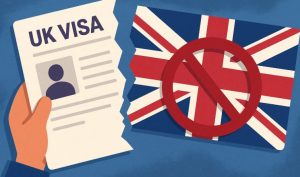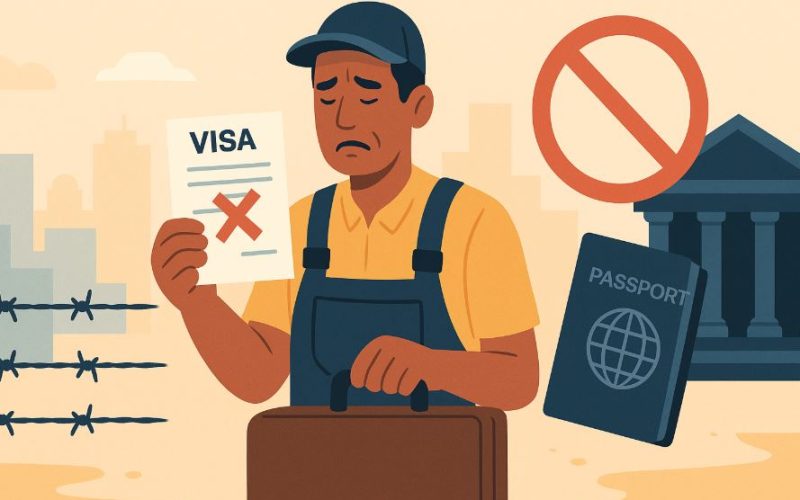Imagine running a business that depends on skilled migrant workers, then one day, you receive a letter from the Home Office stating your sponsor licence has been revoked. For nearly 2,000 companies across the UK this year, this wasn’t just a possibility, it became a harsh reality.
The revocation of migrant worker visa licences is no longer a rare enforcement action; it’s a systemic crackdown aimed at rooting out abuse, non-compliance, and exploitation.
This blog explores the surge in sponsor licence revocations, why it’s happening, the implications for employers, and what businesses must do to stay compliant.
Record Number of UK Visa Sponsor Licences Revoked in 2024–25

Between July 2024 and June 2025, a record 1,948 companies lost their ability to sponsor foreign workers, a sharp increase from 937 revocations the previous year.
This surge marks a critical shift in how the UK government is managing immigration and labour market compliance.
The Home Office has made it clear: businesses failing to meet their obligations under the sponsorship regime will be held accountable.
From adult social care to hospitality, construction to retail, the crackdown is cutting across industries once heavily reliant on overseas workers.
Why Are Migrant Worker Visa Licences Being Revoked?
The revocations are not arbitrary. The most common violations include:
- Underpayment of workers compared to what was promised
- Failure to provide contracted job roles or hours
- Using sponsorship as a route to circumvent immigration rules
- Lack of compliance with record-keeping and reporting duties
These actions not only harm the workers, who often rely on their sponsor to remain legally in the UK, but also undercut British workers and distort fair competition.
“Those who abuse our immigration system must face the strongest possible consequences,” said Migration Minister Mike Tapp, signalling a no-tolerance approach to exploitation.
Sectoral Breakdown – Who’s Most Affected?
According to Home Office data, the sectors with the highest rates of sponsor licence revocation include:
| Sector | Number of Revoked Licences | Common Violations |
| Adult Social Care | High | Illegal hiring, underpayment |
| Hospitality | High | Lack of compliance with job roles |
| Retail | Moderate | Misuse of sponsorship system |
| Construction | High | Promising work that doesn’t exist |
Care providers alone faced £600,000 in fines in the first quarter of 2025, with some firms receiving penalties as high as £210,000.
Government Justification and Strategic Shift

The UK Government has argued that these actions are part of a wider initiative to restore control over immigration and protect vulnerable workers. New measures introduced in July 2025 tightened compliance requirements and imposed stricter eligibility for Skilled Worker Visas.
Key changes include:
- Increased compliance audits
- Emphasis on data sharing between departments
- Reduction in reliance on physical spot checks
- Enhanced penalties and sanctions
This coordinated approach has led to a 51% increase in illegal working arrests, according to the Home Office.
Political and Legal Reactions
While the Government’s crackdown has received support from some quarters, critics argue the system is flawed and potentially harmful to legitimate businesses and their employees.
Chris Philp, Shadow Home Secretary, commented:
“Sectors from care to construction are hooked on imported labour because Labour refuse to train British workers or reform welfare to get people into jobs.”
Meanwhile, Alp Mehmet of Migration Watch UK highlighted that while the numbers are significant, over 50,000 companies still hold active sponsor licences, suggesting enforcement is still not comprehensive.
Potential Diplomatic Impact
Another contentious point involves the threat of suspending visas from countries that do not comply with returns of migrants who have no right to remain in the UK. Countries such as India, Pakistan, Nepal, and Bangladesh have been flagged.
New Home Secretary Shabana Mahmood said:
“We expect countries to play by the rules, and if one of your citizens has no right to be in our country, you do need to take them back.”
However, critics warn that such moves could damage the UK’s trade relationships and international standing, especially with countries essential to the UK’s post-Brexit economic strategy.
What Employers Must Do to Stay Compliant?

To avoid licence revocation, employers should ensure the following:
- Maintain accurate employee records
- Pay the appropriate salary as advertised on the Certificate of Sponsorship
- Keep clear documentation on recruitment and job responsibilities
- Respond promptly to Home Office audits or requests
- Avoid using the sponsorship system for non-genuine employment
A Legal Expert’s Insight
Ross Kennedy, a senior client manager at an immigration law firm, emphasised that the law already allowed visa penalties under the Nationality and Borders Act 2022, but practical and diplomatic barriers often hindered enforcement.
He cautioned employers:
“Getting compliance wrong doesn’t just threaten your business, it impacts your entire workforce, especially migrant workers who are often most vulnerable.”
Conclusion
The revocation of migrant worker visa licences in record numbers is not just a bureaucratic shuffle, it’s a clear signal that the UK government is tightening the leash on immigration compliance.
While it’s essential to prevent abuse and exploitation, employers must be supported with clear guidance and resources to remain compliant.
For legitimate businesses, the message is simple: transparency, fairness, and compliance are non-negotiable. Now is the time for all employers to audit their sponsorship systems, ensure lawful practices, and commit to ethical recruitment.
FAQs
What is a sponsor licence and why is it important?
A sponsor licence allows UK-based employers to hire foreign workers under the Skilled Worker visa route. Without it, hiring overseas talent is illegal.
What are common reasons for licence revocation?
Typical violations include underpaying workers, not offering the promised job, and using the visa system to bypass immigration rules.
Can a revoked licence be reinstated?
Yes, but only after a cooling-off period and demonstrating significant compliance improvements. Legal advice is strongly recommended.
How can companies ensure compliance?
By keeping detailed records, paying promised wages, conducting internal audits, and responding promptly to Home Office requests.
Are certain countries at risk of visa restrictions?
Yes. Countries like India, Pakistan, and Nepal may face reduced access to UK visas if they do not cooperate in migrant returns.
What should employers do immediately?
Conduct an internal compliance review, seek legal advice if needed, and ensure all migrant workers are employed lawfully and ethically.









